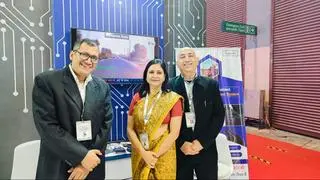When Puneet, who was working in a software company in Noida, felt he wanted to do something different, his interest in the automobile industry led him and his friend and co-founder Nikhilesh Mishra to try out something relating to automobiles.
Puneet realised electric vehicles were going to be the next big thing, but the problems of battery cost and battery range had to be solved for EVs to take off. Around 2013, he and Nikhilesh converted a Tata Ace light commercial vehicle into an electric vehicle to demonstrate battery strength.
He says they were a bit ahead of their time as there was no policy on electric vehicles and, consequently, there were no takers for the vehicle. He realised they could not make a business out of this as it was too costly. But they had learnt quite a lot about batteries and they moved to IIT-Madras for incubation, thanks to Ashok Jhunjhunwala, a faculty member.
Grinntech, according to him, was registered as a company in 2013, but it picked up momentum and growth only after it moved to IIT-Madras.
What has happened since you moved here? “We have started working on the supply of batteries for three-wheelers, two-wheelers, cars and buses. For three-wheelers, our product is getting into the market right now,” says Puneet.
Grinntech, he says, is not a battery manufacturer, but provides lithium battery technology and battery management solutions to battery manufacturers. It develops cell to pack battery technology, explains Puneet. The company imports cells from China, Korea, the US, Germany and Canada. “We are working with different companies that have different cells suitable for various applications,” says Puneet.
The big challenge
The biggest problem with the lithium batteries is the high temperatures in India. Grinntech imports the cells, tests them, and characterises them – how they will behave in different conditions and temperatures. The technology for these cells has been developed in the US and Europe, and they don’t take into consideration the temperatures in India. That technology doesn’t work in India because of the high temperatures, according to Puneet.
“That is why,” he explains, “we need to have good thermal design for the battery packs. We do the thermal design, the mechanical design, the electronic hardware and software, electrical safety systems and complete overall assembly of the battery packs.” Grinntech then licenses this out to battery manufacturers such as Exide and Amara Raja, according to him.

The battery technology developed by Grinntech for three-wheeler electric vehicles is getting commercialised and will be launched in Mohali. Besides for vehicles, the company has also developed battery technology for solar kits, which have a battery, a solar panel, two fans and two lights. This will be distributed in remote areas in Jammu & Kashmir, Assam and Manipur, according to Puneet. There is also another category of customers, called energy operators, that Grinntech will cater to. These energy operators enable battery swapping for vehicles.
According to him, Grinntech works with the Centre of Battery Engineering at IIT-M to test its batteries for different temperatures to see how the cells get impacted. “We develop a lot of cell models out of that, mathematical models to represent the cells and we embed it in our hardware to get the best efficiency out of the pack,” he adds.
Cost-effective
Puneet says the lithium batteries developed by them will be much cheaper than running the vehicles on petrol or diesel. It takes up to 18 months to validate a battery from design to commercialisation, but Puneet says Grinntech has done it in 4-5 months. “This is our USP and we target to complete it in three months.” It took about a year for the company to develop its first battery pack and pilots were done on IIT-M campus.
According to him, Grinntech is a bootstrapped venture and it has got paying customers now, which takes care of salaries.
It will work with its partners to figure out how it can grow its business. Its 60-member team will grow to a 100 in a few months, as it scales up operations and develops battery technology for other applications.








Comments
Comments have to be in English, and in full sentences. They cannot be abusive or personal. Please abide by our community guidelines for posting your comments.
We have migrated to a new commenting platform. If you are already a registered user of TheHindu Businessline and logged in, you may continue to engage with our articles. If you do not have an account please register and login to post comments. Users can access their older comments by logging into their accounts on Vuukle.